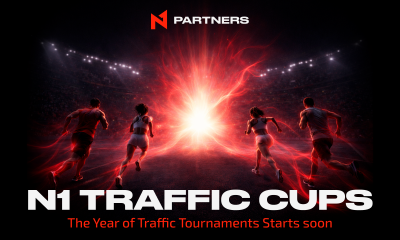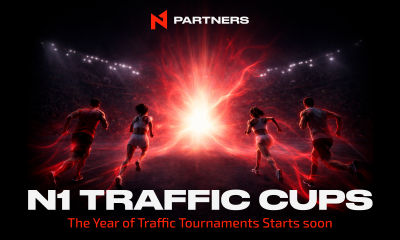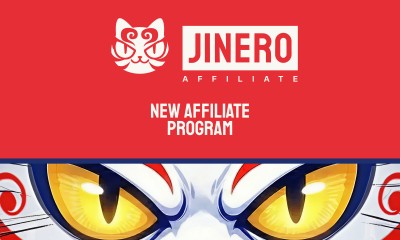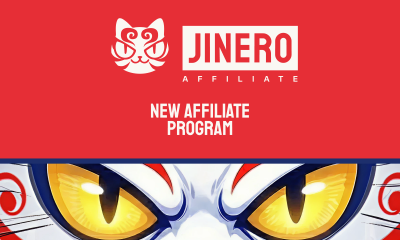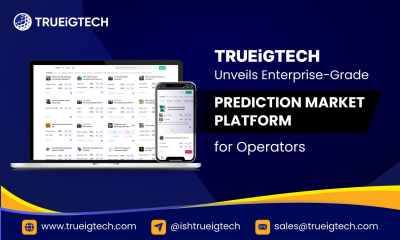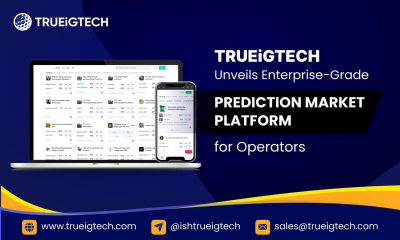Industry News
US iGaming: Three predictions for 2024

Paddy Casey, Co-Founder at sports betting and iGaming developer The Unit, lists what we can expect from US iGaming in the coming year, covering regulation, the battle for market share and the importance of martech.
- iGaming continues to flex its muscles
Internet gaming continues to generate extraordinary revenue in the states that have legalized and embraced it. In October, for example, Pennsylvania’s iGaming revenue was up 24% month-on-month to $154.8m; a record month for the state where the total equates to a whopping 3x the sports-betting take. Pennsylvania is by no means a standout state, as New Jersey reported a 13% year-on-year increase in iGaming revenue for September, to $166.8million.
Where iGaming is fully regulated (as we’ve seen in the six states where it is live currently, with Rhode Island expected to launch fully in Q1 or early Q2 in 2024), it drives significant revenue for the state and offers a safe and protected environment for entertainment versus offshore, unregulated casinos. As states look to plug holes in the post-pandemic era, we anticipate at least two or three states will legalize igaming in 2024, with Indiana and New York being the obvious contenders to begin that process early in the year.
As has been the case since the birth of online gaming in the late 1990s and early 2000s, there are obvious fears about problem gaming and revenue streams moving away from bricks-and mortar casinos. Legislators will drive tough, and hopefully innovative, legislation to protect land-based casinos while paving the way for iGaming, which should in fact complement the land-based casinos. Players, much like music fans, will demand access to ‘live entertainment’; whether that’s in Madison Square Garden cheering on Billy Joel, or listening to Piano Man at home while watching the NFL.
The omni-channel experience with iGaming will become more important as BetMGM for example, can deepen its relationship with players through innovations such as its New Jersey Dual Play Roulette, which offers a truly immersive omni-channel experience. Add this to possibilities around loyalty schemes for resort stays, and this will prove super crucial in the CRM and LTV lifecycles.
Aside from the obvious heavyweights, brands which put players first, treat them like the central stakeholder they ought to be, and personalize the user experience through unique and engaging product and gaming content will be the winners.
- Competition creates cash
This year has been a rollercoaster, in terms of acquisitions and market exits. Kindred recently announced it will be leaving its North American experience behind as quickly as possible. Fanatics can now access every key sports betting state via its PointsBet USA acquisition and Penn Entertainment is planning to shoot for the stars by rebranding its sportsbook as ESPN Bet. Add DraftKings, FanDuel, Bet365 and BetMGM into the ring, and that is one hell of a battle for a share of players’ wallets.
Fanatics and ESPN Bet will most likely use their huge marketing budgets to attract the Gen Z bettors and casual sports fans. Winning the battle to attract, and more importantly retain, this key cohort of players will be significant. Marketing dollars will not be enough; product innovation will be crucial in the attempt to give players the experience they demand. They will demand to be entertained in ways they experience elsewhere.
Outside the ‘big three’ of FanDuel, DraftKings and BetMGM, in terms of US gaming market share, it will only be companies who continue to evolve and innovate their own offering that can close the gap. The likes of Entain and Angstrom, who are well known and have large wallets, can buy the maturity and experience needed. They can make inroads with the quality of their product and people, as well as via the acquisition of operators and challenger brands (particularly when more states go live with iGaming).
- Marketing tech and needle-like focus on ROI
With the big three effectively owning the sports-betting market and making gains in the iGaming space, the chasing pack will need to innovate with needle-like focus on ROI.
Martech is crucial for success in an industry that is seeing shifts in CPAs and one that has historically not merged fragmented data very well. As there is no real single view of acquiring through to retention, and almost zero real data, technology is holding operators back in the battle to retain Gen Z bettors and give them the experiences they demand; i.e. personalization.
Therefore, a holistic 360-view of customer data which is then deployed across multiple marketing channels is the key to being competitive in this landscape. As biddable platforms rely more and more on AI, it is essential that data which is representative of quality customers is used. As experienced industry veterans know, standard first-time depositor data is not enough. In fact, relying on incomplete customer insights can be detrimental to revenue.
As we all know, customer acquisition is only the starting point. Retention and cross-sell is essential to delivering the return on ad spend required to sustain campaigns in this competitive market.
The front-of-mind game is where the winners and losers will ultimately be determined. There is no personalization without sufficient marketing technology integration. Personalization is a key cog in the retention machine you must be leveraging.
As a result, a full martech stack is needed to operate an effective marketing department. The gap between the haves and have-nots in this space will widen not just year-on-year, but also month-on-month.
Gaming Laboratories International
GLI Promotes Patrick Cottingham to Director of Client Services, North America

Gaming Laboratories International (GLI) has promoted Patrick Cottingham to Director of Client Services, North America. Previously, he served as Senior Manager of Client Services. Prior to commencing his career as an engineer with GLI, he served with the US Air Force.
Cottingham’s dedication to his clients was clearly evident both inside and outside of GLI. He transitioned to the Client Services team where he progressed and built a team laser focused on providing the very best customer service where his and his team’s clients have benefited from his engineering and gaming experience.
Ian Hughes, GLI Chief Revenue Officer, said: “We are thrilled to announce Patrick’s well-deserved promotion to Director of Client Services for North America. Patrick leads a team of dedicated and committed client services representatives who ensure our clients receive the best service during their compliance journey with GLI.”
The post GLI Promotes Patrick Cottingham to Director of Client Services, North America appeared first on Americas iGaming & Sports Betting News.
Blueprintx
Zingo Bingo Launches “Your Era” Nostalgia Series Featuring Kerry Katona and Pat Sharp

Zingo Bingo Launches “Your Era” – A Social-First Nostalgia Series for 2026
Zingo Bingo has officially unveiled Your Era, a new short-form social media content series celebrating iconic throwbacks, shared nostalgia and the cultural moments that defined generations. The series launches in February 2026 and will roll out weekly across TikTok, Instagram, Facebook and YouTube.
Designed to strengthen Zingo Bingo’s identity as a home of nostalgic fun, Your Era focuses on authentic conversation rather than traditional promotional content. The format highlights music, fashion, technology and pop culture milestones that shaped each guest’s personal journey.
Kerry Katona and Pat Sharp Headline Series One
The first confirmed guests include Kerry Katona, singer and media personality best known from Atomic Kitten, and Pat Sharp, the iconic radio and TV presenter associated with classic UK entertainment shows. Additional celebrity names will be revealed throughout the year.
Each episode features five themed nostalgia segments crafted to spark memories, conversation and emotional connections among viewers.
What to Expect from “Your Era”
Every guest takes part in recurring throwback features designed to boost engagement and relatability:
- The Memory Bag – Guests reveal five nostalgic items and share the stories behind them
- Flashback Files – A rapid-fire interview covering music, fashion, tech and cultural trends
- Mixtape Memories – Guests curate throwback tracks for the official Your Era playlist
- Taste of the Past – Sampling retro sweets and snacks while rating nostalgia levels
- Yesterday’s News – A humorous headline-guessing game using real throwback media stories
The series aims to tap into the growing popularity of nostalgia-driven digital content while positioning Zingo Bingo as a community-led entertainment brand.
Built by Kinetic Digital and Blueprintx
Your Era has been developed by Zingo Bingo’s operators, Kinetic Digital, in collaboration with long-term creative partner Blueprintx. Blueprintx has previously supported digital and television campaigns for Kinetic Digital brands including Prime Casino and Slingo.
The production strategy prioritises shareable, short-form content optimised for social discovery and influencer amplification, with episodes distributed across dedicated platform pages as well as guest channels.
A Strategic Play for Community Engagement
Jack Watson, Brand Manager at Zingo Bingo, said the series reflects the brand’s commitment to fun, familiarity and connection.
“Your Era is about celebrating the music we replayed, the fads we cringe at and the memories that still make us smile. It’s designed to bring people together through shared nostalgia while reminding audiences that bingo is about enjoying those moments collectively.”
Series one will feature six guests throughout 2026, with new weekly segments designed to drive audience engagement and repeat viewership.
The post Zingo Bingo Launches “Your Era” Nostalgia Series Featuring Kerry Katona and Pat Sharp appeared first on Eastern European Gaming | Global iGaming & Tech Intelligence Hub.
Industry News
Ex-Paysafe VP Justin Fraser takes chief revenue officer role at Yaspa to drive global growth

Yaspa, the renowned fintech focusing on instant payments and identity solutions, today reveals the appointment of Justin Fraser as its Chief Revenue Officer.
Fraser becomes part of Yaspa’s executive team during a crucial period of global growth. He has more than 20 years of commercial leadership experience in the payments ecosystem, having occupied senior leadership positions at notable industry companies like Cybersource, Visa, and Paysafe.
Having a career centered on maneuvering through intricate payment environments, he offers knowledge in rapidly expanding, regulated sectors such as iGaming, cryptocurrency, and financial technology.
As the new CRO, Fraser will manage Yaspa’s worldwide commercial strategy, concentrating on expanding the company’s Intelligent Payment platform, which integrates open banking with AI-powered customer insights, throughout the UK, Europe, and North America.
Yaspa CEO James Neville said: “We are thrilled to welcome Justin to the team during this period of rapid acceleration. His deep expertise in navigating complex regulatory environments and his proven track record in scaling payment solutions are invaluable assets as we expand our footprint in the US and beyond. Justin’s appointment further strengthens our leadership as we continue to help businesses lower costs, grow revenues, and enhance financial compliance through open banking.”
Justin Fraser said: “Yaspa is at the forefront of the shift toward real-time payments. The company’s unique blend of open banking and AI-verified insights solves genuine friction for merchants, particularly in industries like iGaming. I am excited to join such an innovative team and look forward to driving the next phase of our commercial growth globally.”
Fraser will collaborate closely with the recently strengthened US team, which includes the newly appointed US Sales Lead, Peter Kula, and US Senior Solutions Manager, Jackson Esoda.
This statement comes after a year of significant growth for Yaspa, highlighted by increasing its workforce from 15 to 75 employees and successfully securing a $12 million investment round spearheaded by Discerning Capital. In this timeframe, the firm broadened its international presence with new ventures in Atlanta and Leeds, while winning esteemed honors such as the 2025 Payments Award for Real-Time Payments Innovation and a spot on the CB Insights Top 100 Fintech list.
The post Ex-Paysafe VP Justin Fraser takes chief revenue officer role at Yaspa to drive global growth appeared first on Eastern European Gaming | Global iGaming & Tech Intelligence Hub.
-

 Amusnet6 days ago
Amusnet6 days agoWeek 7/2026 slot games releases
-

 Brino Games7 days ago
Brino Games7 days agoQTech Games integrates more creative content from Brino Games
-

 Aphrodite’s Kiss6 days ago
Aphrodite’s Kiss6 days agoLove on the Reels: Slotland Introduces “Aphrodite’s Kiss”
-

 Alex Malchenko7 days ago
Alex Malchenko7 days agoEvoplay Strengthens Canadian Presence with BetMGM Partnership
-

 3 Oaks Gaming7 days ago
3 Oaks Gaming7 days ago3 Oaks Gaming Enters Spanish Market
-

 AMLA7 days ago
AMLA7 days agoAMLA Launches Public Consultation on Three Draft Regulatory Acts
-

 Latest News7 days ago
Latest News7 days agoRed Papaya Presents: Lucky Rainbow Rush Adventure
-

 3 Oaks Gaming7 days ago
3 Oaks Gaming7 days ago3 Oaks Gaming Secures Registration from MINCETUR to Enter the Regulated Peruvian Market



